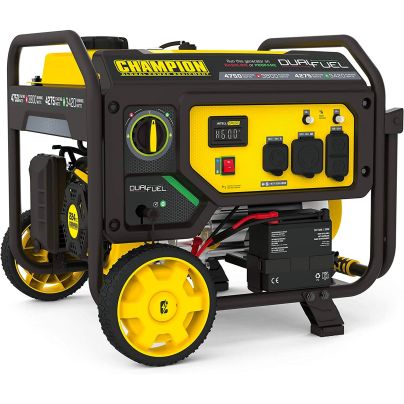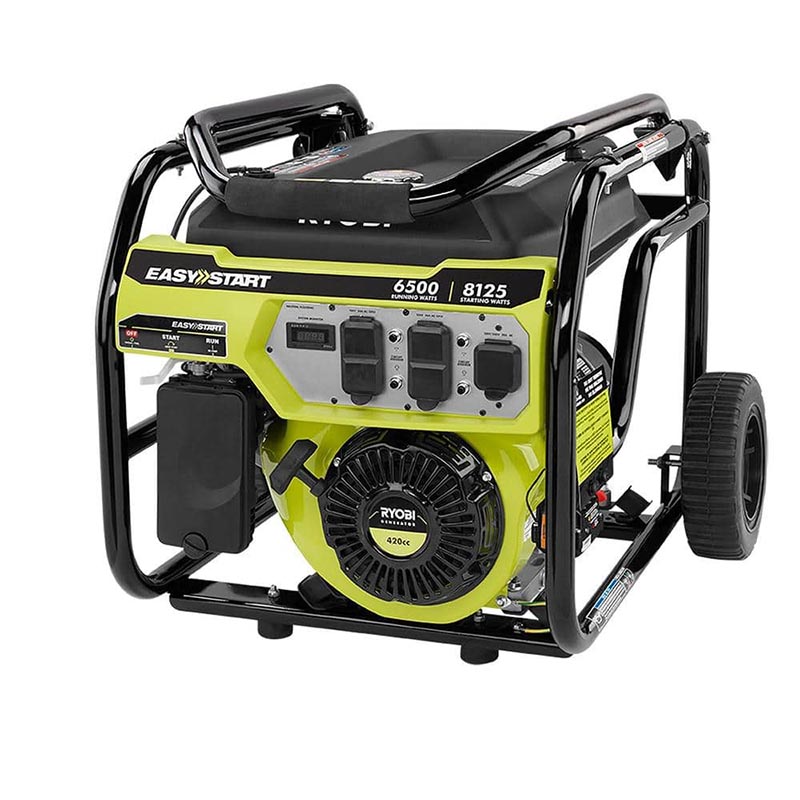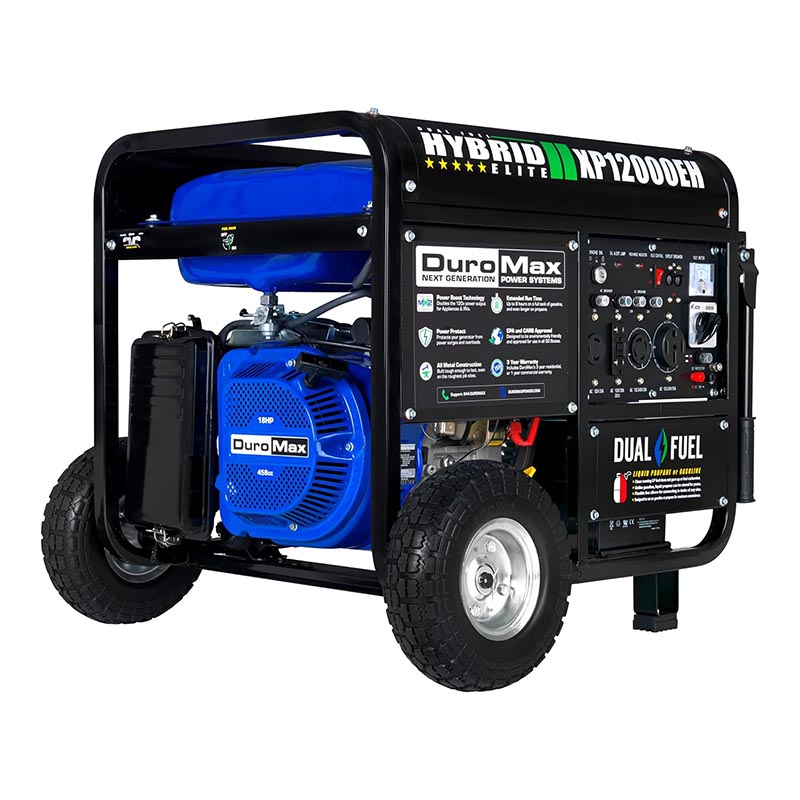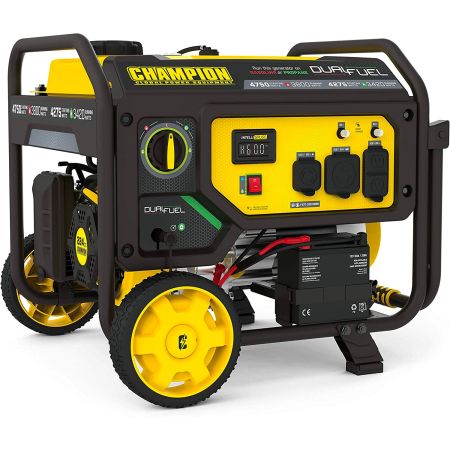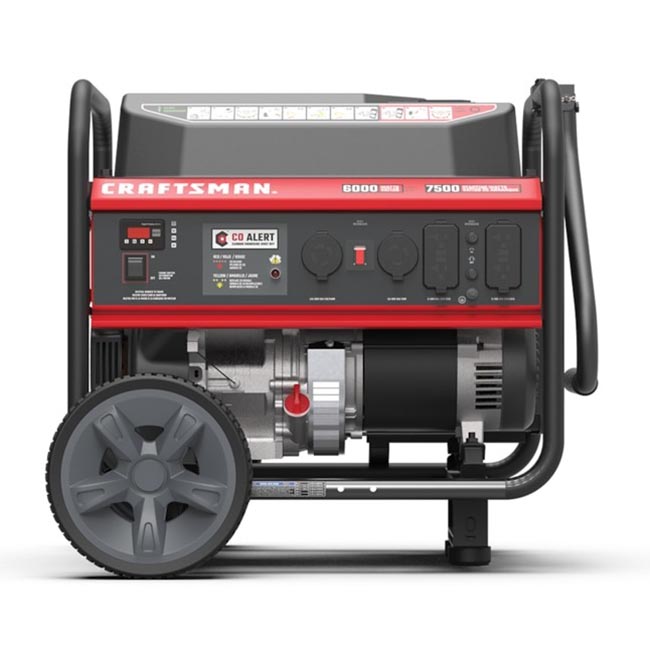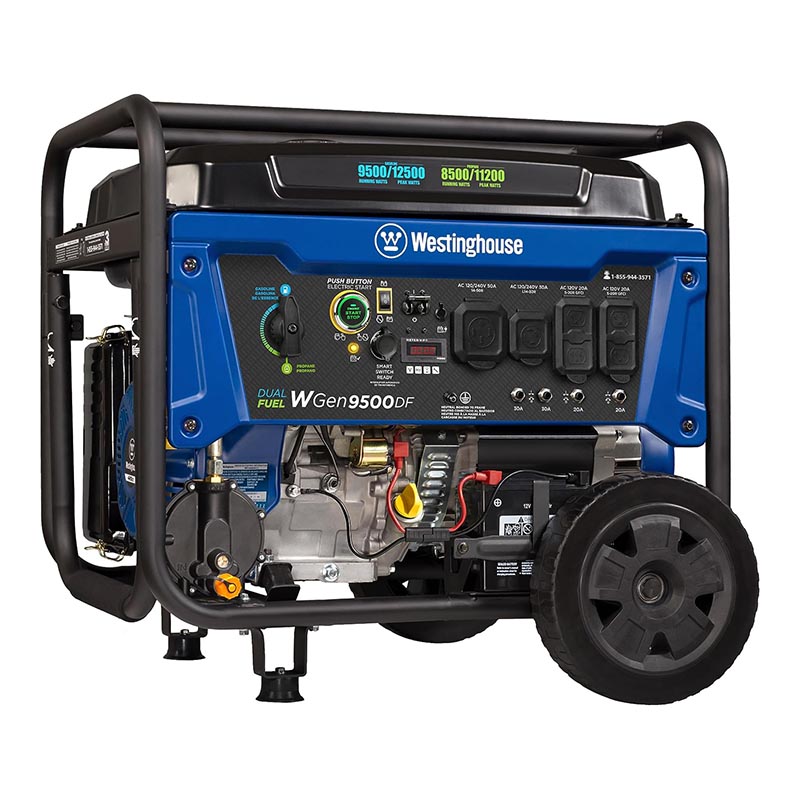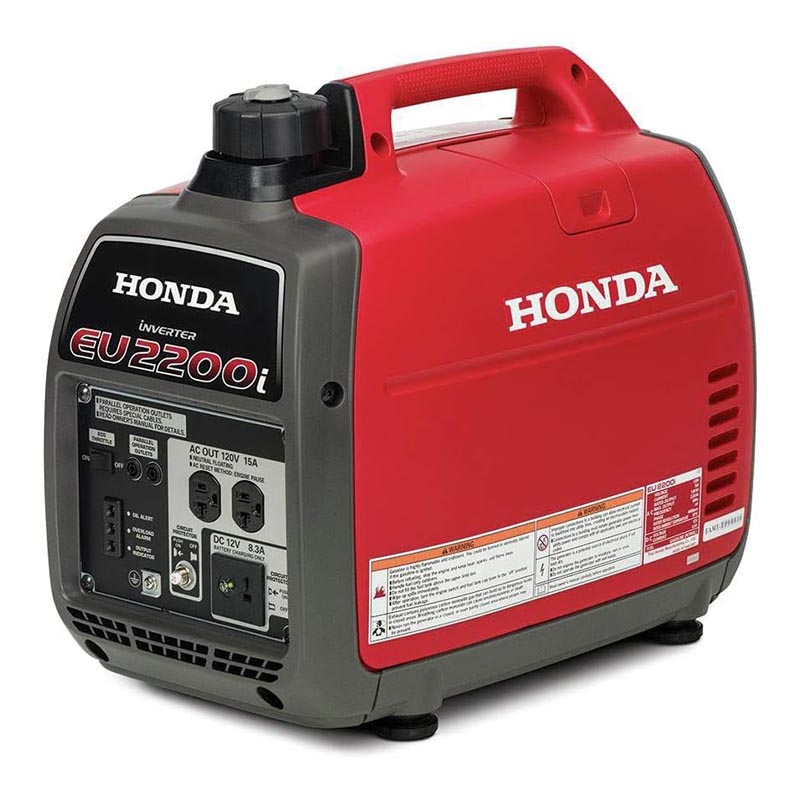We may earn revenue from the products available on this page and participate in affiliate programs. Learn More ›
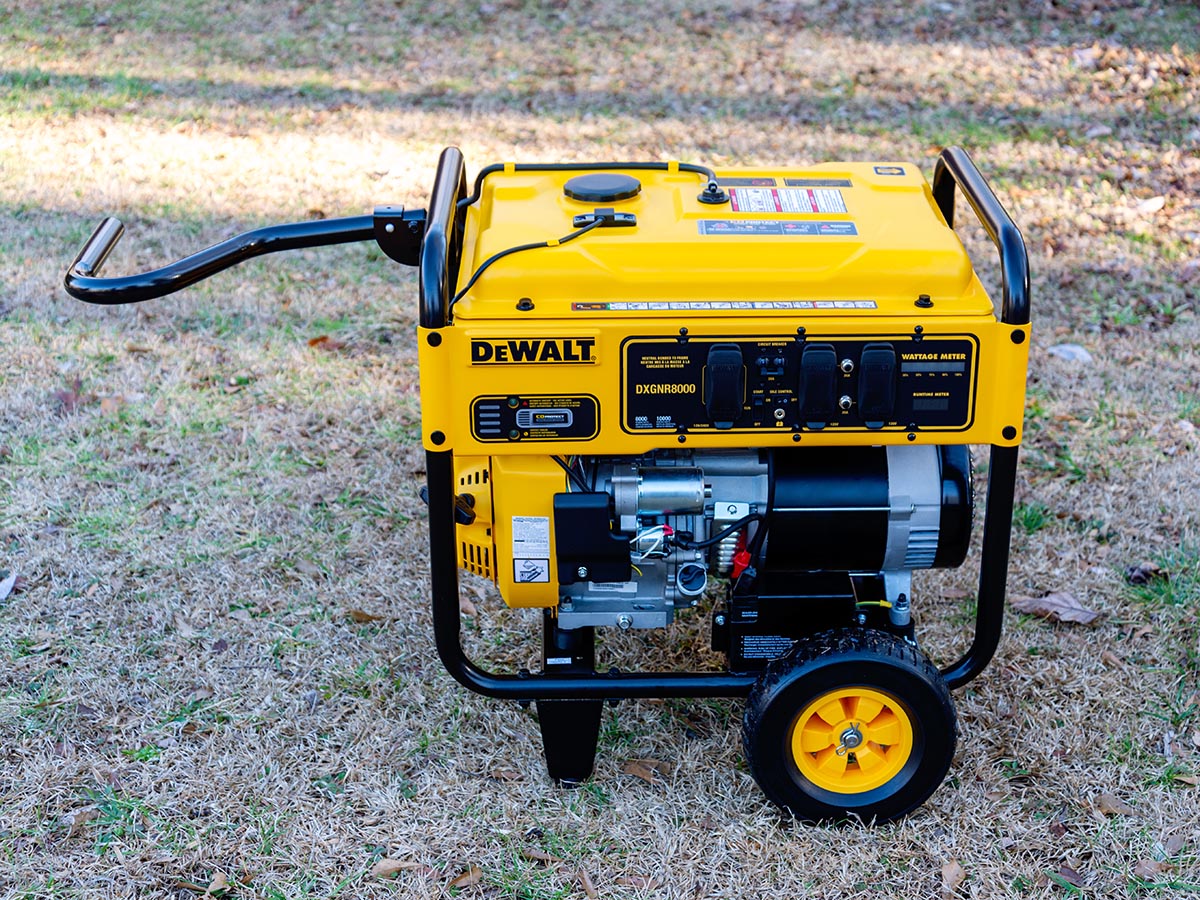
Portable generators can supply power to homes, appliances, electronics, or RVs during a power outage or on a camping trip. Depending on the model, they will produce electricity using gasoline, propane, solar, or some combination. They come with multiple outlet configurations and are easy to transport.
We wanted to know just how good today’s portable generators are, so the Bob Vila test team put them through their paces in our homes, at jobsites, and on the road.
Read on to discover vital shopping considerations and to find out how our top picks fared in hands-on testing. See why these seven options earned a spot on our lineup of the best portable generators.
- BEST OVERALL: Champion 8500-Watt Dual-Fuel Generator with CO Shield
- BEST BANG FOR THE BUCK: Ryobi 6500-Watt Generator with CO Detect
- BEST FOR HOME USE: DuroMax 12,000-Watt Dual-Fuel Portable Generator
- BEST MIDSIZE: Craftsman 6000-Watt CARB-Compliant Portable Generator
- BEST DUAL-FUEL: Westinghouse WGen9500DF Dual-Fuel Generator
- BEST ELECTRIC START: DeWalt 8000-Watt Electric Start Gas Generator
- BEST FOR CAMPING: Honda 2200-Watt Inverter Generator with CO-MINDER
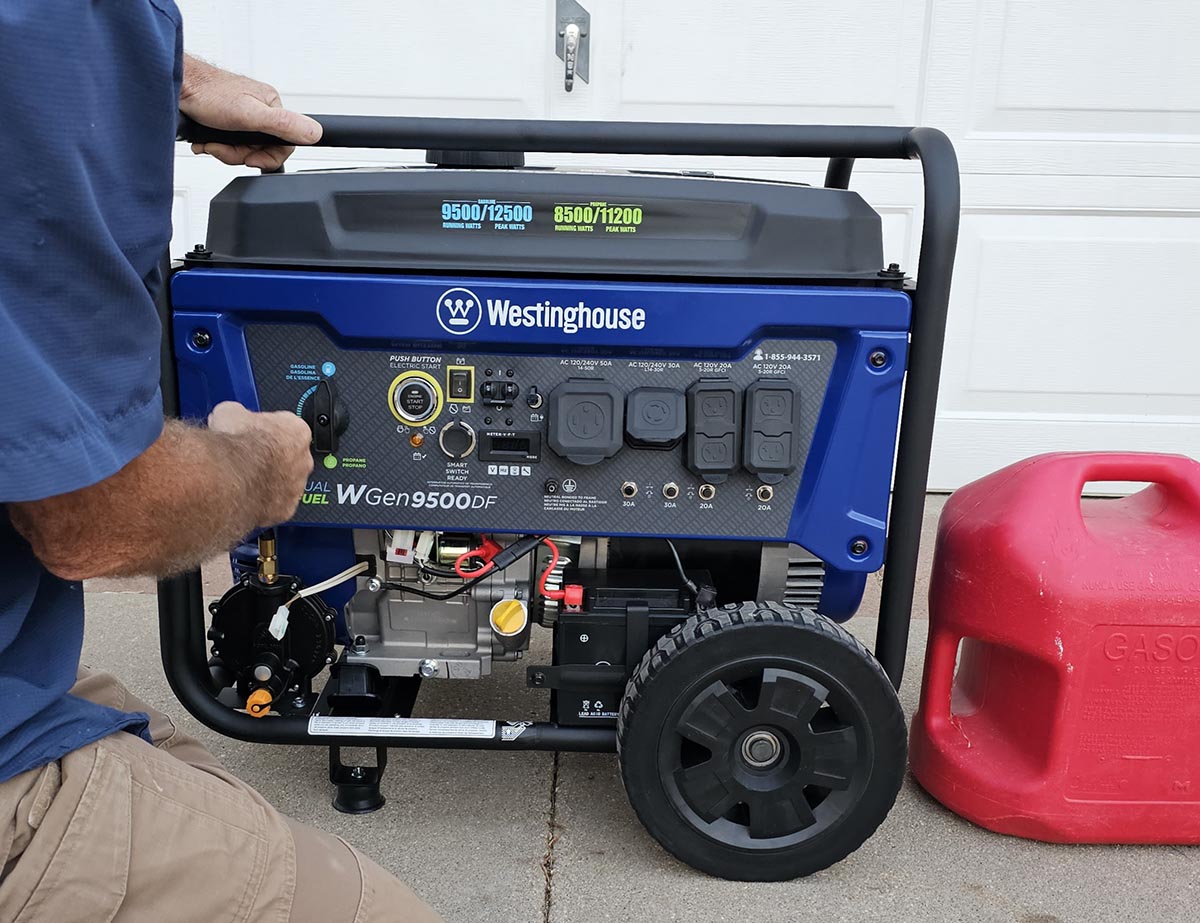
How We Tested the Best Portable Generators
We carefully researched more than 35 portable generators before choosing seven highly rated models for hands-on testing. We looked at consumer satisfaction ratings, ease of use, value, and versatility. We also considered brand to an extent—Champion Power Equipment, Honda, and Westinghouse are all respected in the generator industry. However, we didn’t automatically eliminate smaller brands if their generators were quality built and highly rated. Our goal was to test models that would suit diverse user needs, so you’ll find powerful gas-fueled generators as well as dual-fuel and inverter models on our list.
To test the generators, we assembled and fueled them according to each manufacturer’s instructions. We plugged in tools, appliances, and electronic devices according to an online wattage calculator to see if the generators would produce their advertised power.
We tested the decibel level the generators produced when operating and noted how easy or challenging they were to move. Then we awarded points based on a rubric for how well each generator performed on specific tests and gave ratings for ease of use, noise, portability, power, and value.
Testing Stats
- Products tested: 7
- Hours spent testing: 53
- Tests performed: 5
- Average price: $1,048
Our Top Picks
According to our team test results, the following products represent some of the best portable generators on the market. Whatever your needs may be, there’s likely to be a generator on this list that’ll hit the mark.
Best Overall
Champion 8500-Watt Dual-Fuel Generator with CO Shield
See ItOur Ratings: Ease of Use 5/5; Noise 4/5; Portability 5/5; Power 5/5; Value 5/5
Product Specs
- Wattage: Gasoline: 10,625 peak watts and 8,500 running watts; propane: 9,565 peak watts and 7,650 running watts
- Fuel: Gasoline or propane
- Outlets/ports: One 120V-30A locking outlet; one 120/240V-30A locking outlet; four 120V-20A GFCI outlets
- Weight: 209 pounds
Pros
- Runs on both gasoline and propane, making it versatile for different users
- Suits a range of power needs with 6 outlets: two 30A and four 20A
- Built-in carbon monoxide shutoff is an added safety feature
Cons
- Relatively heavy at 209 pounds—too heavy for 1 person to lift into a truck bed
The Champion 8,500-watt generator is a portable yet powerful emergency backup generator and off-grid power source. We tested it using gasoline and propane, and it easily powered a fridge, space heater, and lights. We also connected it to our travel trailer’s 30-amp cord, and it generated enough power to run all our major appliances.
This generator offers six outlets: one 120V-30A locking, one 120/240V-30A locking, and four 120V-20A GFCIs. It has a digital display for monitoring runtime and power output and a built-in detector that shuts down the generator in case of elevated levels of carbon monoxide gas.
This unit is heavy at 209 pounds, making it challenging for a single person to lift alone. It does come mostly assembled, aside from the user needing to install the wheel kit, which takes just a few minutes to attach.
If you’re looking for a serious generator with enough power to run several tools or appliances simultaneously, you won’t be disappointed with this Champion model.
Read our full review: Champion 8500-Watt Dual-Fuel Generator with CO Shield
Get the Champion portable generator at Lowe’s, Tractor Supply Co., or The Home Depot.
Best Bang for the Buck
Ryobi 6500-Watt Generator with CO Detect
See ItOur Ratings: Ease of Use 4.5/5; Noise 4/5; Portability 3/5; Power 4.5/5; Value 4.5/5
Product Specs
- Wattage: 8,125 peak watts and 6,500 running watts
- Fuel: Gasoline
- Outlets/ports: One 120/240V-30A outlet; four 120V-20A GFCI outlets
- Weight: 195 pounds
Pros
- Powered by a dependable and easy-to-start Ryobi 420cc OHV gas engine
- Wraparound hand truck–style frame and large wheels enhance portability
- Two 120-volt 20-amp duplex outlets and a 120/240-volt 30-amp twist locking outlet can handle a wide range of portable power needs
- Automatic voltage regulator ensures reliable and consistent power supply
- Modest price point for a high-quality portable generator
Cons
- Handle design requires a steep tilt for transport, which can be tough to balance
- Recoil start only; not equipped with an electric starter
For inexpensive off-grid electricity or an affordable home backup generator, the Ryobi offers one of the best watts-per-dollar values in our guide. Plus it comes equipped with numerous desirable features such as a dependable Ryobi engine, a rugged hand truck frame with 10-inch wheels and a fold-down handle, and a carbon monoxide sensor with automatic safety shutoff. The gas tank holds 6 gallons of fuel to keep the motor running for up to 10 hours on a 50 percent load.
The Ryobi generator came mostly assembled, other than the wheels and handle. After adding oil and gas, we were pleasantly surprised when the engine started on the first pull, particularly since it doesn’t have an electric start option.
When it came to power production, the Ryobi let us easily run a couple of portable saws, a router, and work lights—plugged into the 120-volt 20-amp duplex outlets—for several hours without interruption. We also tried the 30-amp twist lock outlet with a three-way service cord to power the tools, and everything worked perfectly.
While we appreciated that this heavy model has wheels, we still found maneuvering it awkward. We had to push the handle down to about a 45-degree angle and exert constant downward force while moving the 195-pound machine. But for its numerous features and ample power, the Ryobi is a great option.
Get the Ryobi portable generator at The Home Depot or Ryobi.
Best for Home Use
DuroMax 12,000-Watt Dual-Fuel Portable Generator
See ItOur Ratings: Ease of Use 3/5; Noise 4/5; Portability 5/5; Power 4.5/5; Value 4/5
Product Specs
- Wattage: Gasoline: 12,000 peak watts and 9,500 running watts; propane: 11,400 peak watts and 9,025 running watts
- Fuel: Gasoline or propane
- Outlets/ports: One 120/240V-50A outlet; one 120/240V-30A locking outlet; one 120V-30A locking outlet; two 120V-20A GFCI outlets
- Weight: 224 pounds
Pros
- Runs on gasoline or propane, offering users convenient flexibility
- Keyed electric start that is easier on the back and shoulders than pull starts
- More affordable than most other 12,000-watt generators
- Built-in carbon monoxide detector protects users from dangerous conditions
Cons
- Does not have an hour meter or any way to track runtime, requiring users to keep track
- Does not come with dust covers to protect the multiple outlets when they’re not in use
- Only 2 standard 120V-20A outlets for regular power cords
When it comes to portable generators, 12,000 watts is near the top end, power-wise. The DuroMax XP12000EH is a dual-fuel monster that can power several tools and appliances simultaneously without throwing the breaker.
We tested the DuroMax using gasoline and propane. It’s designed to run up to 8 hours on a full 8.3-gallon gas tank and up to 7 hours on propane at 50 percent capacity. It also has a couple of perks we really liked, including an electric starter—because who wants to hand-crank an engine when temps are bitter?—and a CO sensor that automatically shuts down the generator if it senses hazardous levels of carbon monoxide gas.
The DuroMax has several plug-in ports, including a 120V-30A locking outlet, a 120/240V-30A locking outlet, two 120V-20A GFCI outlets (for standard power cords), and one 120/240V-50A outlet. We tested it by running our refrigerator, most of the entertainment devices in our home, and even a window AC that pulls a lot of juice. It didn’t lag at all.
Though we liked its power, the DuroMax missed the mark in a few areas. It doesn’t have drop-down covers to protect the outlets, and it only has two 120V standard outlets. Overall, though, we found this generator powerful and easy to use, particularly at this price point.
Read our full review: DuroMax 12,000-Watt Dual-Fuel Portable Generator
Get the DuroMax portable generator at Amazon, Tractor Supply Co., or Walmart.
Best Midsize
Craftsman 6000-Watt CARB-Compliant Portable Generator
See ItOur Ratings: Ease of Use 4.5/5; Noise 4/5; Portability 3/5; Power 3/5; Value 4.5/5
Product Specs
- Wattage: 7,500 peak watts and 6,000 running watts
- Fuel: Gasoline
- Outlets/ports: Two 120V-30A outlets; four 120V-20A outlets
- Weight: 163 pounds
Pros
- Well-designed control panel features dust covers and sealed switches
- Very easy to unpack and assemble; can begin using right away
- Delivers powerful wattage in a relatively compact size and has wheels for easy moving
Cons
- Handle design is uncomfortable and awkward
- Wheels are plastic and might not hold up to long-term use on gravel surfaces
If you’re looking for a mid-range backup generator that won’t take up too much room in the garage, check out the Craftsman 6,000-watt portable generator. It features two 120V-30A and four 120V-20A outlets for plugging in various tools and appliances.
This portable generator has an 8-gallon fuel tank and a recoil start. While many of today’s new generators come with electric starts, we found it easy to pull-start the Craftsman—and there’s less (electronically) to go wrong. This unit weighs 163 pounds, so you’ll need two or more strong people to lift it into and out of a truck or trailer. Its large wheels and handle make it easier to roll the generator once it’s on the ground, but the handle design is somewhat clunky and seems ill-suited for the generator.
We tested the Craftsman by plugging in our refrigerator, an air compressor, a large space heater, a TV, and some corded power tools. The Craftsman surged and got a little louder when we ran the air compressor, but it still handled the load without flipping its breaker switch.
While this 6,000-watt generator doesn’t run on propane, it’s a nice option for those who want reliable backup power or power on a remote jobsite.
Read our full review: Craftsman 6000-Watt CARB-Compliant Portable Generator
Get the Craftsman portable generator at Lowe’s.
Best Dual-Fuel
Westinghouse WGen9500DF Dual-Fuel Generator
See ItOur Ratings: Ease of Use 4.5/5; Noise 4/5; Portability 4/5; Power 5/5; Value 4.5/5
Product Specs
- Wattage: Gasoline:12,500 peak watts and 9,500 running watts; propane: 11,200 peak watts and 8,500 running watts
- Fuel: Gasoline or propane
- Outlets/ports: One 120/240V-50A outlet; one 120/240V-30A locking outlet; four 120V-20A GFCI outlets
- Weight: 211 pounds
Pros
- Runs on either gasoline or propane, making it versatile in most situations
- Comes with 3 ways to start: electric, remote, and recoil
- Powerful 457cc 4-stroke engine for powerful electrical generation
- Features digital data display for real-time information about voltage, frequency, and runtime
Cons
- On the heavy side at 211 pounds, making it a challenge to lift onto a truck bed
The WGen9500DF is a portable dual-fuel generator that runs on gasoline and propane. It has a 457cc 4-stroke engine and features a 120/240V-50A outlet, a 120/240V-30A locking outlet, and four 120V-20A GFCI outlets. This is a heavy model, weighing in at 211 pounds, but it came mostly assembled—all we had to do was install the wheels and the handle.
We tested the generator using gasoline first, followed by propane, and got similar results for both. The generator features a 6.6-gallon gasoline tank that will keep it running for up to 12 hours at a 25 percent load. Actual tank runtime may vary depending on the quality of the gasoline and the electrical load you’re pulling. When connected to a 20-pound propane tank, the generator is designed to run up to 7 hours pulling a 50 percent load.
One of the nicest perks was the ability to start the generator from a distance using a remote control fob. We could start it while standing 90 feet away.
On both gas and propane, the generator ran several power tools simultaneously and powered an oven, range, and clothes dryer (at separate times) without throwing a breaker. This is an excellent pick for those who want an emergency generator that will power more than just a couple of cell phones or tablets.
Read our full review: Westinghouse WGen9500DF Dual-Fuel Generator
Get the Westinghouse portable generator at Amazon or Walmart.
Best Electric Start
DeWalt 8000-Watt Electric Start Gas Generator
See ItOur Ratings: Ease of Use 4.5/5; Noise 4/5; Portability 4/5; Power 4.5/5; Value 4.5/5
Product Specs
- Wattage: 10,000 peak watts and 8,000 running watts
- Fuel: Gasoline
- Outlets/ports: One 120/240V-30A outlet; four 120V-20A GFCI outlets
- Weight: 183 pounds
Pros
- Push-button electric starter eliminates the strain and hassle of pull-starting
- 120/240V twist lock outlet suitable for home emergency backup applications
- 7.5-gallon gas tank keeps the generator running up to 9 hours with a 50 percent load
- Carbon monoxide and low oil safety shutoffs protect the user and the equipment
Cons
- Powerful single-phase generator uses a lot of gas; not practical for low-draw applications
Portable electricity should be reliable, and you shouldn’t have to worry about whether the engine will start. The electric starter did the job even on a 12-degree Fahrenheit morning. It also has one of the smoothest recoil starters we tested.
This generator produces 8,000 running watts and up to 10,000 peak watts. It features an idle control button to conserve fuel and reduce noise during intermittent use. It delivers electricity through two 120-volt 20-amp duplex receptacles and a 120/240-volt 30-amp twist lock receptacle.
The DeWalt generator delivered more than enough power for our “two saws and a router” shop test, so we plugged a refrigerator into the fourth outlet. The breakers did not trip, and all the equipment worked as intended.
This portable generator is big and heavy (183 pounds without fuel) but balanced within its frame well. The fold-down handle and large wheels made it relatively easy to roll across the yard. Getting it in and out of the truck requires a team lift effort. The noise level was not too bad considering the output—similar to a gas lawn mower.
For those needing a lot of portable power, this generator fits the bill. Its wattage, outlets, and large 7.5-gallon fuel tank make it a smart general-use pick.
Get the DeWalt portable generator at The Home Depot, ToolUp, or CPO Power Tools.
Best for Camping
Honda 2200-Watt Inverter Generator with CO-MINDER
See ItOur Ratings: Ease of Use 5/5; Noise 4/5; Portability 4/5; Power 5/5; Value 4/5
Product Specs
- Wattage: 2,200 peak watts and 1,800 running watts
- Fuel: Gasoline
- Outlets/ports: Two 125V-20A outlets
- Weight: 47.4 pounds
Pros
- Portable inverter generator provides cleaner electricity with lower noise and fuel consumption
- Eco throttle system boosts fuel efficiency and reduces equipment wear and tear
- Up to 8.1-hour runtime per tank of gas; suitable for providing long-term power
- Built-in fuel shutoff, circuit protector switch, CO-MINDER, and oil alert
- Bluetooth connectivity enables monitoring via the Honda My Generator mobile app
Cons
- Does not come with USB outlets; requires a hub or power strip to power small electronics
- Limited fuel capacity; will require more frequent refueling for extended use
A portable inverter generator is a great choice for tailgating, camping, and powering sensitive electronics. The lightweight Honda EU2200i inverter generator features a dependable Honda GXR120 commercial series engine. It produces up to 2,200 starting watts, 1,800 running watts, and 120 volts. It’s equipped with an easy-to-use off/start/run selector knob and a smooth-pulling recoil starter. Best of all, this quiet model only produces between 48 and 57 decibels while in use.
The compact size of the Honda EU2200i made it very easy to load and go. It weighs just over 47 pounds and has a well-designed top handle, so carrying it a few yards from the shed to the truck was no problem. Its 0.95-gallon tank provides up to 8.1 hours of runtime for a 25 percent load or 3.2 hours of continuous maximum output. We used eco throttle mode (which automatically adjusts power output to match the electrical load) to power a refrigerator for 4 hours, using about a half gallon of gas.
The Honda’s 15A duplex receptacle operates like a three-prong electrical outlet, which allowed us to plug in our devices without worrying about overloading the circuit. It provides plenty of electrical service for basic home backups and can power up a portable table saw and miter saw simultaneously. Plus, it is parallel-ready (conversion kit sold separately), so users can run two together to double the output.
Get the Honda portable generator at Amazon, Lowe’s, The Home Depot, or Northern Tool + Equipment.
Jump to Our Top Picks
What to Consider When Choosing a Portable Generator
Choosing which portable generator to buy depends on how much power you need, which fuel type you prefer, and where you intend to take it.
Wattage
Generators vary by the number of watts they are capable of producing. To find the right option, determine how many watts you will need. The answer depends on how you want to be able to use your generator.
Make a list of must-have appliances and write down how many watts each one needs to start. Lighting typically requires 60 to 200 watts to start, a refrigerator needs about 600 watts, and a space heater or electric water heater may need as many as 1,500 watts. For many homeowners, a generator in the 5,000- to 7,000-watt range provides sufficient energy for power outages and large appliances.
Fuel Type
That list of must-have appliances also affects whether the best choice will be dual-fuel capable or will need to run on gas, propane, diesel, or solar power.
- Dual-fuel generators do the same job as single-fuel generators. They run on propane or gasoline, allowing users to choose the fuel based on their needs, including power requirements, noise restrictions, and availability in the area. They have an isolated gasoline tank with a fuel capacity that ranges from as small as 2 gallons to more than 10 gallons. The larger the fuel tank on the generator, the longer the generator can provide gasoline-based power. For generators with smaller fuel tanks, users may want to consider keeping an extra gas can on hand.
- Gas generators are very reliable options. As gasoline is a widely available fuel source, it is a common choice for portable generators. The primary disadvantages are that gasoline is more expensive and less efficient than other fuel sources, and gasoline engines typically emit the highest levels of carbon monoxide. Also, storing gasoline for long periods requires a fuel stabilizer, and if it’s stored incorrectly, gasoline can present a significant fire hazard.
- Diesel generators are also a reliable option. Although generators fueled by diesel aren’t as common as those fueled by gasoline, diesel is more affordable, more efficient, and can be stored for longer periods without a stabilizer. Diesel storage also doesn’t pose as significant a fire hazard as gasoline.
- Propane generators are clean burning and affordable. Propane generators may be tied into a home’s primary propane gas tank or have a designated tank strictly for the generator. The main disadvantages are that propane isn’t as energy efficient as other fuel sources, and a generator fueled by propane will usually have a shorter runtime and produce less power. Propane also presents a fire hazard if stored incorrectly.
- Solar generators are a great source of power for portable battery banks. As opposed to the energy used in gas generators, solar energy is silent, clean, and affordable. It’s also free. The disadvantages are that the power capacity is determined by the number and size of the panels and the size of the battery it charges. A solar panel’s ability to charge a battery is also dictated by the amount of available sun, so it isn’t as reliable a fuel source as other options.
Inverter Generators
Portable inverter generators produce electricity in three phases, first creating a high-frequency AC, which is then inverted to DC and then again to standard AC. Not only do portable inverter generators create more electricity, but this process also produces a very stable electrical flow, which is necessary for protecting delicate electronic systems such as those in computers and office equipment.
Weight
Portable generators can be heavy in order to supply power to small or large appliances, homes, power tools, and even RVs. A good rule of thumb with generators is that the larger the unit, the more power output it likely has. Many portable generators range in weight from 90 to 200 pounds, but they usually come with built-in handles and wheels to help with maneuvering and portability.
Alternatively, some small portable generators weigh between 20 and 50 pounds, but these supply less power than larger generators.
Noise Level
Portable gas-powered portable generators can be pretty loud. But some quiet generators are built with noise-absorbing glass wool, special mufflers, and vibration-absorbing feet. If users anticipate noise being an issue, the best generators to consider are ones specially designed to do their work effectively but quietly.
A dual-fuel generator will produce 50 to 90 decibels of noise, depending on the size of the generator, the type of fuel (gasoline runs louder than propane), and the unit’s power output. Most generators fall between 65 and 75 decibels, which is comparable to the noise produced during normal conversation.
To understand the range of sound produced by a generator, consider these common sounds and their equivalent operating decibel levels:
- Refrigerator: 40 decibels
- Hair dryer: 90 decibels
- Motorcycle: 100 decibels
The quietest dual-fuel generators belong to a relatively small group of products that utilize dual-fuel technology and inverter technology to create a dual-fuel inverter generator.
Accessories
While the above features are important aspects to consider before purchasing a portable generator, there are a few special features included in select models that add convenience and power.
- Wheel kits are often sold separately, as are the transfer switches that enable users to wire the generator’s output to an electrical panel. Before you look for a generator deal, make sure to understand what, if any, components are going to be missing.
- Multiple outlets: Multiple outlets are convenient and help distribute the generator’s electrical load when powering multiple devices. A portable generator with at least two household electrical outlets is recommended for efficiently spreading the electrical load. Generators may also have RV outlets and USB ports.
- Line sharing: Purchasing a set of like-branded generators will often allow users to wire them in parallel, also known as load sharing. This means that by using a brand-specific kit, you can plug one generator into another to combine their wattages and produce even more power. Load sharing can also be a less expensive way to produce enough wattage to run large appliances or simultaneously power everything in an RV.
FAQs
Looking for more information about portable generators? Consider the answers to some of the most frequently asked questions about this particular type of generator.
Most portable generators will not provide enough power for a typical house. Portable generators are designed to power important items like appliances and digital devices. For more reliable backup power, consider a standby generator.
While a 22-kilowatt-hour generator may be enough to power most essentials and some smaller homes, it may not be powerful enough to power a medium- to large-size home.
Users looking for a home backup generator will want to look for a heavy-duty model that produces at least 7,500 watts of power. This size generator can power many of a home’s small-to-large appliances. Many of these models may be heavy, often weighing over 100 pounds.
A home experiencing a power outage can rely on a generator with outputs of 7,500 to 12,000 watts. This is enough to power small and large devices while keeping the lights on. The best models also rely on automatic shutoffs or surge protection to ensure reliable usage without malfunctioning.
Portable generators are known for being loud, but there are options with sound-dampening features that reduce noise.
It isn’t recommended to run a portable generator unattended, and this includes overnight. Most appliances will be fine if left unpowered for a period of time. However, food in an unpowered refrigerator can go bad after 4 hours, and food in a freezer without power can become unsafe after 24 hours.
If you need to run a portable generator overnight, ensure it has been well maintained and sits on stable ground away from the house to eliminate any chance of tipping over or causing carbon monoxide poisoning.
Most portable generator brands provide models lasting over 20 years or 3,000 hours of use.
Meet the Testers
The Bob Vila test team is made up of contractors, remodelers, home design enthusiasts, and freelancers from across the nation. Each member is dedicated to delivering high-quality product information to our readers so they can shop with confidence, knowing the products they purchase have been fully tested and vetted.
Glenda Taylor is a contractor, product tester, and writer. With experience in both residential and commercial building applications, she focuses primarily on construction, woodworking, and DIY tools and techniques.
Mark Wolfe is a writer and product tester, focused on mechanical durability and user convenience. As a green industry veteran and an avid DIYer, he has gained valuable insight on choosing dependable power equipment and avoiding poor-quality machinery.
Tom Scalisi is a full-time DIY and construction writer for many of the largest websites in the industry, including BobVila.com, This Old House, Family Handyman, and Forbes. He also owns and operates a pest control blog called RiddaBugs.com.
Additional testing performed by Zach Lazzari.
